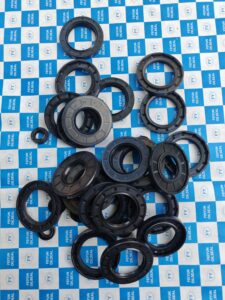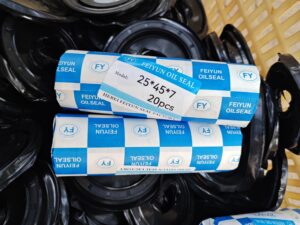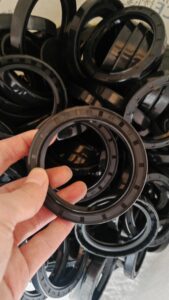Table of Contents
ToggleWhat is Oil Seal TC?
Oil Seal TC is a specialized type of skeleton oil seal widely used in mechanical systems to retain lubricants (e.g., oil, grease) and prevent contaminants (dust, water, debris) from entering critical components. Its design, material composition, and performance characteristics make it indispensable in automotive, hydraulic, and industrial applications. Below is a comprehensive overview of its structure, applications, and advantages.



1. Definition and Structural Design
Skeleton Oil Seal Framework
The term “TC” refers to the seal’s reinforced metal skeleton (often steel or aluminum), which provides structural integrity and dimensional stability. This metal framework:
- Maintains the seal’s shape under mechanical stress.
- Enhances durability in high-pressure or high-speed environments.
- Prevents deformation during installation or operation.
Lip Design and Spring Mechanism
TC oil seals feature elastomeric sealing lips (typically single or double lips) paired with a garter spring:
- Primary Lip: Retains lubricants by maintaining tight contact with the rotating shaft.
- Secondary Lip (in double-lip designs): Blocks external contaminants like dust and moisture.
- Garter Spring: Ensures consistent radial force against the shaft, compensating for wear or minor misalignments.
2. Key Applications
TC oil seals are engineered for dynamic sealing in demanding environments:
Automotive Systems
- Engines: Seals crankshafts, camshafts, and transmission shafts.
- Power Steering: Prevents fluid leakage in steering pumps.
- Axles and Differentials: Protects gear lubrication in rear axles.
Hydraulic Machinery
- Pumps and Valves: Ensures leak-free operation in high-pressure hydraulic systems.
- Cylinders: Seals piston rods to maintain hydraulic fluid integrity.
Industrial Equipment
- Agricultural Machinery: Used in tractors, harvesters, and excavators.
- Rotary Shafts: Common in conveyor systems, motors, and gearboxes.
3. Material Composition
TC seals are manufactured from materials tailored to specific operational demands:
| Material | Properties | Common Use Cases |
| NBR (Nitrile Rubber) | Excellent oil resistance, cost-effective. | General-purpose automotive seals. |
| FKM/FPM (Fluorocarbon) | High-temperature resistance (up to 200°C), chemical stability. | Hydraulic systems, chemical processing. |
| Silicone/EPDM | Extreme temperature tolerance (-50°C to 200°C), UV/ozone resistance. | Aerospace, food-grade machinery. |
4. Performance Features
High-Temperature Resistance
TC seals withstand temperatures up to 200°C (FKM) while maintaining Shore A hardness levels of 70–75, ensuring reliability in engines and hydraulic pumps.
Pressure and Speed Tolerance
- Pressure Resistance: Engineered for systems up to 60 MPa (e.g., hydraulic pumps).
- High-Speed Compatibility: Effective in shafts rotating at 20+ m/s due to low-friction lip designs.
Customization Options
- Sizes: Standard dimensions like 25×35×6 mm or 28×43×7 mm, with custom sizes available.
- Configurations: Variants include TC (single lip), TG (double lip), and SC (heavy-duty) types.
5. Advantages Over Standard Seals
- Extended Service Life: The metal skeleton resists wear and deformation, outperforming non-reinforced seals.
- Versatility: Compatible with oils, greases, fuels, and hydraulic fluids.
- Contaminant Exclusion: Double-lip designs provide dual protection against leakage and ingress.
6. Example Use Case: Hydraulic Pump Motor
A TCV 25×35×6 mm TC oil seal is installed in a hydraulic pump motor to:
- Prevent oil leakage under 60 MPa pressure.
- Withstand temperatures up to 150°C (NBR/FKM hybrid construction).
- Ensure smooth operation in high-speed rotational applications.
7. Sourcing and Storage Guidelines
Procurement
- Suppliers: Manufacturers like Dongguan DTO Fluid Sealing Technology offer bulk pricing starting at ,For example, Feiyun Seals Factory
- 0.02–
- 0.02–0.1 per piece.
- Certifications: Look for ISO 9001-compliant suppliers for quality assurance.
Storage Best Practices
- Temperature: Store below 30°C to prevent premature aging.
- Environment: Avoid exposure to UV light, moisture, and ozone.
8. Technical Innovations
Modern TC seals incorporate adaptive lip designs that:
- Accommodate housing thermal expansion.
- Compensate for shaft surface irregularities.
- Maintain sealing efficiency in oscillating or vibrating systems.
Conclusion
Oil Seal TC is a robust sealing solution combining a metal skeleton, elastomeric lips, and spring mechanisms to address the challenges of rotating machinery. Its adaptability to extreme temperatures, pressures, and contaminants makes it a cornerstone of automotive, hydraulic, and industrial systems. For optimal performance, ensure proper sizing, material selection, and storage conditions.



Leave A Comment